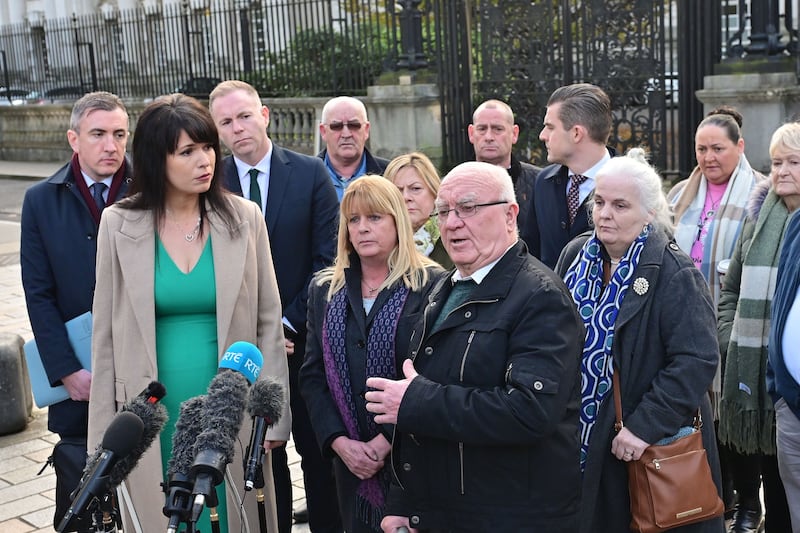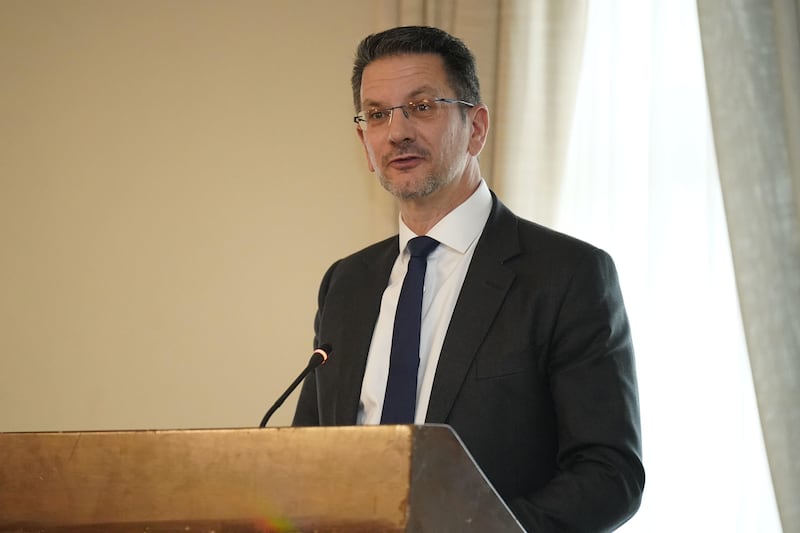“I think we will get to the truth… You might have to wait a while but the truth always comes out. It always does. And you can’t move forward into some new process until the wounds of the past have been healed.”
Aidan McAnespie’s late sister, Eilish McCabe in How The GAA Survived The Troubles by Desmond Fahy
THE mistake often made in the retelling of the killing of Aidan McAnespie is that he was going to play a match the day that he was shot dead.
Aghaloo were playing Killeeshil on the first day of the new Tyrone league season in February 1988.
Ordinarily he would have been togging out (albeit mostly for the club’s reserve team), but he’d had bother with a troublesome knee. It had flared up again, so he was going to watch instead.
He’d been to school with lads from Killeeshil. It’d be a day’s craic and slagging.
He parked his car on the northern side of the checkpoint around 10 minutes before throw-in, setting off down the hill towards the pitch with two other local men he met there.
Paddy Mullan and his father-in-law walked a few yards with him until Paddy remembered he’d forgotten something in his car, and the pair of them went back to get it.
Aidan McAnespie walked on alone past the British Army checkpoint. Three bullets were fired from the sangar behind him. One of them killed him instantly.
In February of this year, former Grenadier Guardsman Jonathan Holden was given a suspended sentence after being found guilty of manslaughter.
He was the first former British soldier to be found guilty of an historical offence since the Good Friday Agreement was signed a decade later.
In the statement made by Holden after the killing, the then-18-year-old solider said that he’d observed McAnespie taking his football bag from the boot of his car after he parked it up the road in Coronation Park rather than try to negotiate the checkpoint in his vehicle.
McAnespie’s family have always contended that he had no football bag with him because he was injured and was only going to watch.
When Holden was given a three-year suspended sentence, members of the McAnespie family stood outside Laganside Court holding banners bearing the word ‘Bill of shame’ and ‘Families deserve truth and justice’.
Their mother had passed away before the trial began. Their father, John senior, and sister Eilish, so prominent in the campaign for justice, both died during the lengthy proceedings.
For more than a quarter of a century, they were obstructed at every turn. They were given hope that was ripped away while the truth lay wrapped in layers of concealment.
The conviction – manslaughter, rather than murder – and the suspended sentence handed down looked on one hand like a form of very rare justice. On the other hand, it felt woefully inadequate when pitted against the experiences of an entire community with British forces.
If the despicable Tory government that seemingly, and hopefully, have a very short time left in power gets their way, then it will very rare indeed.
Last week a bill passed through the House of Commons that would offer a conditional amnesty on the prosecution of anyone guilty of murder during the Troubles.
Fergal McCusker was shot dead in Maghera as he made his way home from a night out on January 18, 1998.
No-one has ever been charged with his murder, which was admitted by the LVF, whose leader Billy Wright had just been killed in prison.
Four men were arrested but later released.
His family have claimed it was six hours before the RUC responded to calls.
It took until February this year for an inquest to open into Fergal ‘Rick’ McCusker’s death.
His family have always believed that collusion was a factor in his killing.
McCusker’s home in Maghera is just a few miles from Bellaghy, where eight months previously, Sean Brown had been abducted by members of the same loyalist organisation and murdered.
Sean was chairman of the Bellaghy GAA club, another entirely innocent man locking up at the end of a meeting.
His family have fought with the establishment for years. After finally being granted an inquest, they’ve found its progress repeatedly and continually stunted.
Ordering the PSNI to hand over files in 2016, Lord Justice Weir questioned whether they could “be bothered” to do their work properly. Seven years ago.
In June of this year, two days of evidence were due to be heard. They were postponed when the PSNI and the Ministry of Defence failed to produce sensitive disclosure.
By then, the implications of the Legacy Bill had become very obvious. Any inquest that has not concluded by May next year will be closed.
In cases across the north, the British government has callously watched the clock tick past on family members for decades, hoping that the flame they carry for truth and justice will die out with them.
St Enda’s in Glengormley suffered more than most, losing six members to paramilitaries during the Troubles.
Gerry Devlin was one of them, assassinated by a loyalist gang in December ’97.
Like the others, his family have had no answers, no justice. Nobody arrested, nobody charged while the same suspicions of collusion hung over the murder.
At least the Tories named the bill aptly.
After 30 years of facilitating the murder of innocent people, it’s a fitting legacy indeed that even after all this time the British government would continue to twist the knife into grieving families.
They’ve done some shameful things around the world, going back centuries.
Their cruelty knows no end.
It’s a bill that is bad for everyone here, on every side. The round condemnation from all quarters shows that this is not the way to do things.
The damage they’re prepared to do to keep the files sealed ought to remind those that curtsy to them and wave the flag on their behalf of just how little they actually care.
It cannot be let lie.








